语法复习七——倒装句
- 格式:doc
- 大小:49.00 KB
- 文档页数:7
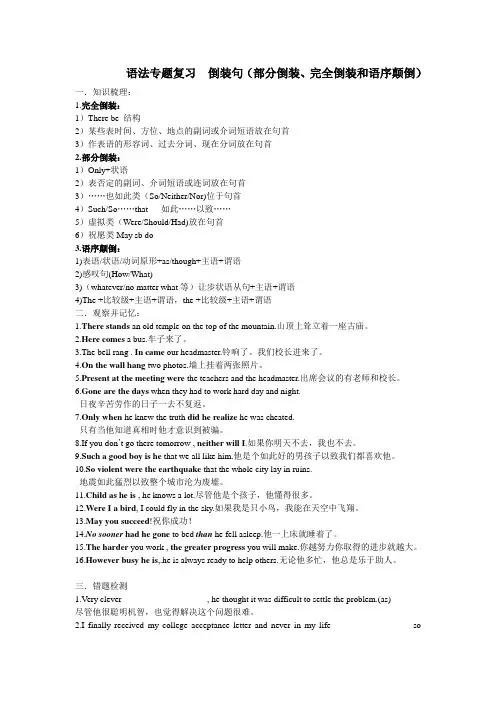
语法专题复习倒装句(部分倒装、完全倒装和语序颠倒)一.知识梳理:1.完全倒装:1)There be 结构2)某些表时间、方位、地点的副词或介词短语放在句首3)作表语的形容词、过去分词、现在分词放在句首2.部分倒装:1)Only+状语2)表否定的副词、介词短语或连词放在句首3)……也如此类(So/Neither/Nor)位于句首4)Such/So……that 如此……以致……5)虚拟类(Were/Should/Had)放在句首6)祝愿类May sb do3.语序颠倒:1)表语/状语/动词原形+as/though+主语+谓语2)感叹句(How/What)3)(whatever/no matter what等)让步状语从句+主语+谓语4)The +比较级+主语+谓语,the +比较级+主语+谓语二.观察并记忆:1.There stands an old temple on the top of the mountain.山顶上耸立着一座古庙。
2.Here comes a bus.车子来了。
3.The bell rang . In came our headmaster.铃响了。
我们校长进来了。
4.On the wall hang two photos.墙上挂着两张照片。
5.Present at the meeting were the teachers and the headmaster.出席会议的有老师和校长。
6.Gone are the days when they had to work hard day and night.日夜辛苦劳作的日子一去不复返。
7.Only when he knew the truth did he realize he was cheated.只有当他知道真相时他才意识到被骗。
8.If you don’t go there tomorrow , neither will I.如果你明天不去,我也不去。

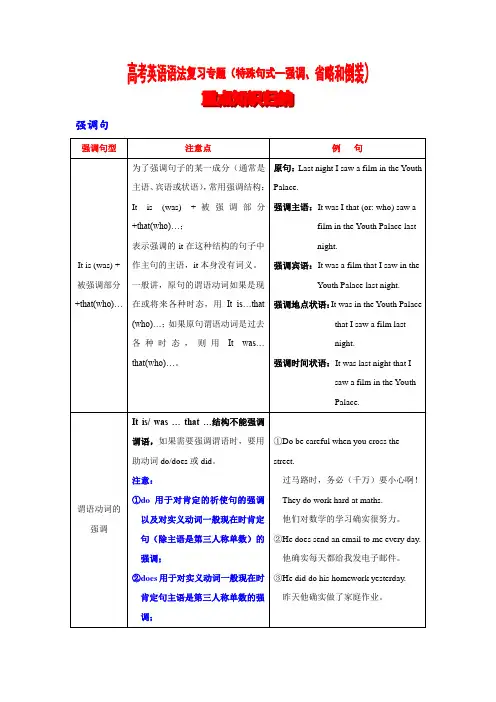
强调句③did用于对实义动词一般过去时肯定句的强调。
It is (was) +被强调部分+that(who)…句型的变式It is (was) + 被强调部分+that(who)…句式基本特征:Is/ Was it +被强调部分+that…;或情态动词+it+ be+被强调部分+ that…①Was it in 1969 ________ the American astronautssucceeded _______ landing on the moon ?A. when; onB. that; onC. when; inD.that; in②Could it be in the restaurant in ______ you haddinner with me yesterday ______ you lost yourhandbag?A. that; whichB. which; thatC. where; thatD. that; where特殊疑问句形式句式基本特征:特殊疑问词+is/was it that…?或特殊疑问词+情态动词+it+be++被强调部分+that…—_______is it _______has made Peter _______heis today?—Determination.A. What; that; thatB. That; that; whatC. What; what; thatD. What; that; what反意疑问句形式句式基本特征:It is/was+被强调部分+that…,isn’t/ wasn’t it?It was Alice and her boyfriend who sent the old manto the hospital, ______?A. do theyB. didn’t theyC. wasn’t itD.was it强调句与其它句型的结合与名词从句的结合句式特征为:整个强调句型用作名词性从句或者在强调句型中含有名词性从句。
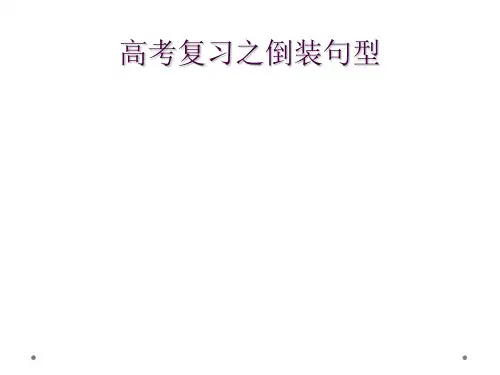
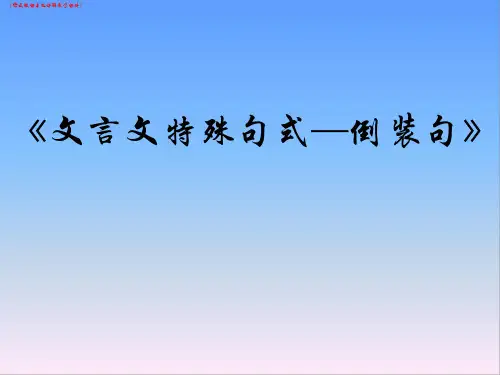

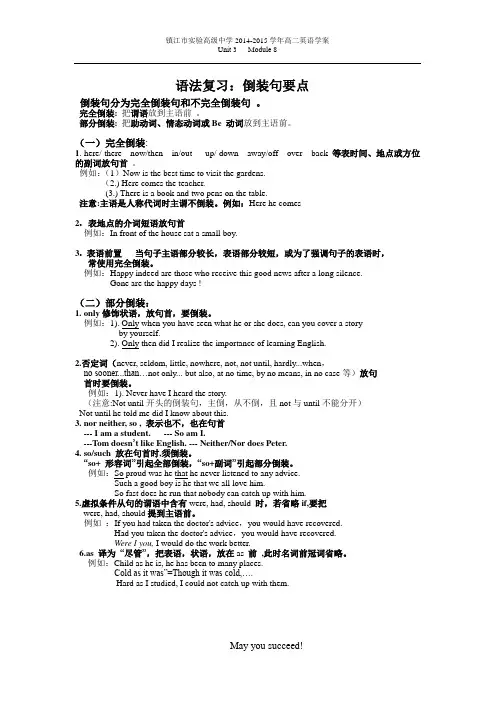
镇江市实验高级中学2014-2015学年高二英语学案Unit 3 Module 8May you succeed!语法复习:倒装句要点倒装句分为完全倒装句和不完全倒装句 。
完全倒装: 把谓语放到主语前 。
部分倒装: 把助动词、情态动词或Be 动词放到主语前。
(一)完全倒装:1. here/ there now/then in/out up/ down away/off over back 等表时间、地点或方位的副词放句首 。
例如:(1)Now is the best time to visit the gardens.(2.) Here comes the teacher.(3.) There is a book and two pens on the table.注意:主语是人称代词时主谓不倒装。
例如:Here he comes2. 表地点的介词短语放句首例如:In front of the house sat a small boy.3. 表语前置 当句子主语部分较长,表语部分较短,或为了强调句子的表语时,常使用完全倒装。
例如:Happy indeed are those who receive this good news after a long silence. Gone are the happy days ! (二)部分倒装:1. only 修饰状语,放句首,要倒装。
例如:1). Only when you have seen what he or she does, can you cover a storyby yourself. 2). Only then did I realize the importance of learning English.2.否定词(never, seldom, little, nowhere, not, not until, hardly...when ,no sooner...than…not only... but also, at no time, by no means, in no case 等)放句首时要倒装。
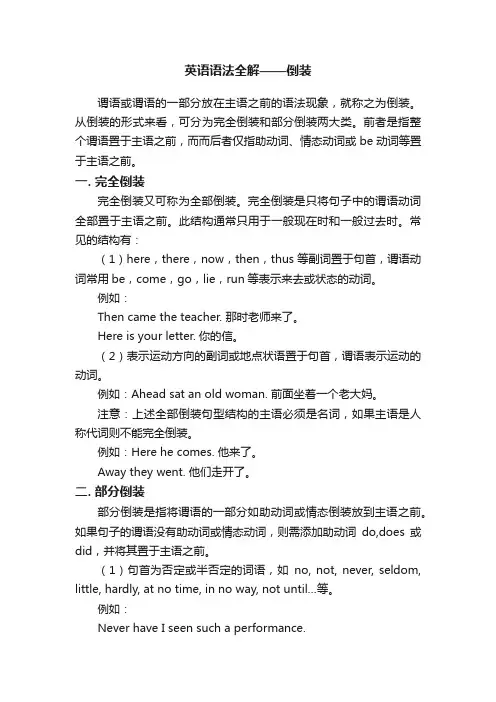
英语语法全解——倒装谓语或谓语的一部分放在主语之前的语法现象,就称之为倒装。
从倒装的形式来看,可分为完全倒装和部分倒装两大类。
前者是指整个谓语置于主语之前,而而后者仅指助动词、情态动词或be动词等置于主语之前。
一. 完全倒装完全倒装又可称为全部倒装。
完全倒装是只将句子中的谓语动词全部置于主语之前。
此结构通常只用于一般现在时和一般过去时。
常见的结构有:(1)here,there,now,then,thus等副词置于句首,谓语动词常用be,come,go,lie,run等表示来去或状态的动词。
例如:Then came the teacher. 那时老师来了。
Here is your letter. 你的信。
(2)表示运动方向的副词或地点状语置于句首,谓语表示运动的动词。
例如:Ahead sat an old woman. 前面坐着一个老大妈。
注意:上述全部倒装句型结构的主语必须是名词,如果主语是人称代词则不能完全倒装。
例如:Here he comes. 他来了。
Away they went. 他们走开了。
二. 部分倒装部分倒装是指将谓语的一部分如助动词或情态倒装放到主语之前。
如果句子的谓语没有助动词或情态动词,则需添加助动词do,does或did,并将其置于主语之前。
(1)句首为否定或半否定的词语,如no, not, never, seldom, little, hardly, at no time, in no way, not until…等。
例如:Never have I seen such a performance.从未见过如此糟糕的表演。
Nowhere will you find the answer to this question.无论如何你不会找到这个问题的答案的。
Not until the child fell asleep did the mother leave the room.母亲一直到孩子入睡后才离开房间。
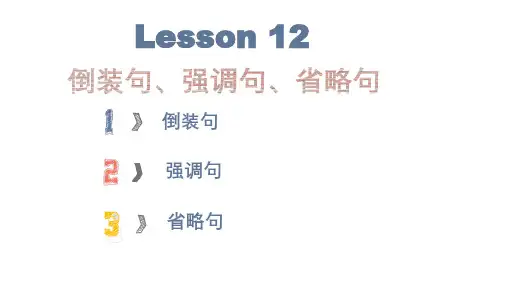
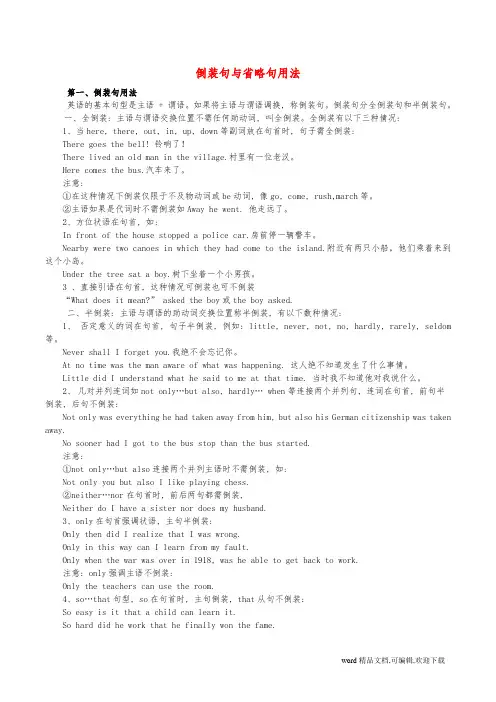
word精品文档,可编辑,欢迎下载 倒装句与省略句用法 第一、倒装句用法 英语的基本句型是主语 + 谓语。如果将主语与谓语调换, 称倒装句。倒装句分全倒装句和半倒装句。 一、全倒装: 主语与谓语交换位置不需任何助动词, 叫全倒装。全倒装有以下三种情况: 1、当here, there, out, in, up, down等副词放在句首时, 句子需全倒装: There goes the bell! 铃响了! There lived an old man in the village.村里有一位老汉。 Here comes the bus.汽车来了。 注意: ①在这种情况下倒装仅限于不及物动词或be动词, 像go, come, rush,march等。 ②主语如果是代词时不需倒装如Away he went. 他走远了。 2、方位状语在句首, 如: In front of the house stopped a police car.房前停一辆警车。 Nearby were two canoes in which they had come to the island.附近有两只小船,他们乘着来到这个小岛。 Under the tree sat a boy.树下坐着一个小男孩。 3 、直接引语在句首, 这种情况可倒装也可不倒装 “What does it mean?” asked the boy或the boy asked. 二、半倒装: 主语与谓语的助动词交换位置称半倒装, 有以下数种情况: 1、 否定意义的词在句首, 句子半倒装, 例如: little, never, not, no, hardly, rarely, seldom等。 Never shall I forget you.我绝不会忘记你。 At no time was the man aware of what was happening. 这人绝不知道发生了什么事情。 Little did I understand what he said to me at that time. 当时我不知道他对我说什么。 2、 几对并列连词如not only…but also, hardly… when等连接两个并列句, 连词在句首, 前句半 倒装, 后句不倒装: Not only was everything he had taken away from him, but also his German citizenship was taken away. No sooner had I got to the bus stop than the bus started. 注意: ①not only…but also连接两个并列主语时不需倒装, 如: Not only you but also I like playing chess. ②neither…nor在句首时, 前后两句都需倒装, Neither do I have a sister nor does my husband. 3、only在句首强调状语, 主句半倒装: Only then did I realize that I was wrong. Only in this way can I learn from my fault. Only when the war was over in 1918, was he able to get back to work. 注意: only强调主语不倒装: Only the teachers can use the room. 4、so…that句型, so在句首时, 主句倒装, that从句不倒装: So easy is it that a child can learn it. So hard did he work that he finally won the fame. word精品文档,可编辑,欢迎下载

主谓一致和倒装【用法讲解】考试要求:从学英语开始就涉及主语和谓语的一致性,是英语学习及考查的基础,从单项选择到书面表达,都可能涉及到主谓一致的问题,是中考试卷必考题目。
主谓一致就是句子的谓语动词形式在人称和数上必须和句子的主语保持一致,叫主谓一致。
这种关系一般要遵循三个原则:语法上一致的原则;意义上一致的原则和就近一致的原则。
倒装句因为与汉语语言习惯的不同和较多的句型结构而成为初中英语的难点,虽然初中英语涉及到的倒装句型不算太多,在中考试卷中也总有一定的比例,尤其在阅读理解和完形填空中对上下文的理解会有很大的影响,因此也是中考复习的重点。
1. 语法一致原则谓语和主语通常从语法形式上取得一致,主语为单数形式,谓语动词也用单数形式;主语为复数形式,谓语动词也为复数形式。
如:The boy is clever enough to study maths well. 这个男孩够聪明,可以把数学学好。
Everybody in my class tries to do well in English. 我们班每个人都努力学好英语。
(1)下列情况谓语动词只能用单数:1)不可数名词或可数名词单数作主语,谓语动词用单数形式。
如:Water is very important to the trees. 水对树来说非常重要。
2)动词不定式或者动名词短语作主语时,谓语动词用单数形式。
如:To improve your English is the most important work.提高你的英语是最重要的工作。
Watching TV too much is bad for your eyes.看电视太多对你的眼睛有害。
3)不定代词each,one,another,something,somebody,nothing,nobody,everyone,everything,anyone,anything等作主语时,谓语动词用单数形式。
1 语法复习七:倒装句 英语最基本的语序是主语在前,谓语动词在后。但有时由于句子结构的需要或表示强调,就要采用倒装形式。将谓语动词完全移到主语之前称为完全倒装,只将助动词或情态动词放到主语之前称为部分倒装。强调性倒装和以so, neither, nor开头的句子是高考例题的热点。 (一)倒装句的意义 1、适应一定的语法结构的需要,主要是指疑问句句型结构的需要。 e.g. May I come in? Was the People’s Liberation Army founded in 1927?
2、为了强调某一部分,而把这部分放到句首,构成倒装。 e.g. Never have I been late for school this term. So early did he come to school that no other students came.
(二)倒装的使用情况
1、在 “there be” 结构里,there是引导词,主语在be后。 e.g. There is a box on the table. 2、在疑问句中。 e.g. Is she singing in the classroom? What does your mother do?
3、在here, there等副词开头的某些句子里(要用一般现在时态)。如
果主语是人称代词,主语和主要动词的词序不变。(完全倒装) e.g. There goes the bell. Here is an apple for you. There she comes.
4、重复倒装句型,用在以so, nor, neither开头,表示谓语所述的情况
也适用于另一个人或一事物的肯定或否定句中。so用于肯定句,表示“也一样”、“也这样”;nor, neither用于否定句,表示“同样也不,也不这样”。 e.g. I am watching TV. So is she. My parents didn’t watch TV last night. Neither (Nor) did I. 2
5、直接引语的全部或一部分放在句首时,主句中的主谓也常直接倒装。(完全倒装) e.g. “Very well,” said the French student. “Bring me two eggs and a cup of tea, please.” said he.
6、在以never, little, hardly, not only, few, not, seldom等否定副词开
头的句子中,采用部分倒装。如不放在句首就不要倒装。 e.g. Little did he say at the meeting. Never shall I forget the day when I joined the Army.
比较:I shall never forget the day when I joined the Army.
7、用于以only所修饰的副词、介词短语或状语从句的句子中。(注意当修饰主语时不倒装) e.g. Only when the war was over in 1918 was he able to get happily back to wrk. Only in this way can we learn English well.
注意:如果only后的词组不是状语,不需倒装。 e.g. Only Wang Lili knows this. 8、为了表达生动,有时把表地点、方位的副词,如 up, down, out, aw
ay, in等放在句首,同时把谓语动词放在主语之前。若主语为人称代词,主语和谓语动词的位置不变,只将副词放在句首。(完全倒装) e.g. Away hurried the boy. Out rushed the girl.
9、在虚拟结构中,条件从句的谓语含有were, had 和should这三个词
是,可省去if,将这些词移至主语之前。 e.g. Had I time (= If I had time), I would go and help you. Were I you (= If I were you), I would go abroad. Should he come (=If he should come), tell him to ring me up.
10、as引导让步状语从句时要倒装(形容词/ 副词/ 名词/ 动词 + as +
主语 + 谓语)。 e.g. Proud as they are, they are afraid to see me. 3
Child as he is, he seems to know everything.(child前不加冠词) Hard as he worded, he made little progress. 11、用于某些表示祝愿的句子里。 e.g. May you succeed! Long live the People’s Republic of China!
12、So + 形容词、副词及such 置于句首时要倒装。 So happy did he feel. Such was me.
英语倒装句 【知识简介】 一般陈述句结构为“主语+谓语”,如果将句子某一部分移到句子前面而引起主语和谓语的顺序颠倒就成了倒装。疑问句一般均为倒装,但我们这里将不予讨论。 倒装有两种情况:部分倒装(助动词放在主语之前)和全部倒装(整个谓语部分放在主语的前面)。
【要点难点】 1) 部分倒装 ① 含有否定意义的副词(有时是词组)置于句首以表示强调时,句子用部分倒装形式。这类词有: not, never, never before, nowhere, no longer, in no time, not a + 名词, not a single + 名词, not often, at no time(决不,注意和in no time[立刻,不用倒装]不同), by no means(决不), in/under no circumstances(决不), in no way(决不), on no account(决不), in no case(决不), seldom, little, hardly, scarcely, rarely, barely(仅仅、很少、几乎不), still less(更不用说) Never before have I shown it to anyone. 我从来没有拿给任何人看过。 Never before in my life have I enjoyed such beautiful scenery. 我一生中从未欣赏过如此之美景。 Little did I realize what was upsetting him. 我完全没意识到什么让他不高兴。 Nowhere could I see him. 哪儿都见不到他。 By no means is it true that all English people know their own language well. 并非所有的英国人都通晓本国语。 He doesn’t even like her; still less is it his intention to marry her. 他甚至不喜欢她,更不用说打算娶她。 Not a single word did he say for a whole hour. 他整整一小时一句话也没说。 Under no circumstances must you relax your efforts for a moment. 在任何情况下,你一刻也不能放松自己的努力。 Neither do I know her address, nor does he. 我不知道她的地址,他也不知道。 Not could the patient eat, nor could he drink. 那个病人既不能吃,也不能喝。 4
Seldom in my life have I met so determined a person. 一生中我很少见到如此果断的人。 At no time will I give up my belief. 我决不会放弃我的信念。(注意和这一句不同:In no time, he gave up his effort to survive. 他立刻就放弃了求生的努力。这里没有用倒装句)
② 两个重要倒装句型: Hardly/Scarcely had A happened when B happened.(A刚发生B就发生了。) No sooner had A happened than B happened. (A刚发生B就发生了。) Hardly had he begun to speak when his wife stopped him. 他刚开口说话就被他妻子制止了。 Hardly had she come into the room when he saw someone disappearing through the French window. 她一走进房间就看见有个人穿过落地窗不见了。 No sooner had I left my house than it began to rain. 我刚刚离开家就下雨了。 Scarcely had he gone out when it began to rain. 他刚一出门就下起雨来。 No sooner had he gone to sleep than the telephone rang once again. 他刚睡着,电话铃又响了。
③ Not until倒装句型。 完全形式为:Not until/till + 某一时间(用名词词组、介词词组或从句表达)+ 助动词 + 主语 + 谓语其他部分. Not until a long time afterwards did I realize that he was mixed up with the gang. 过了很长时间之后我才知道他与那一帮人厮混在一起。 Not until I lost that job did I realize the importance of learning a foreign language. 我失去了那份工作之后才意识到学习一门外语的重要性。